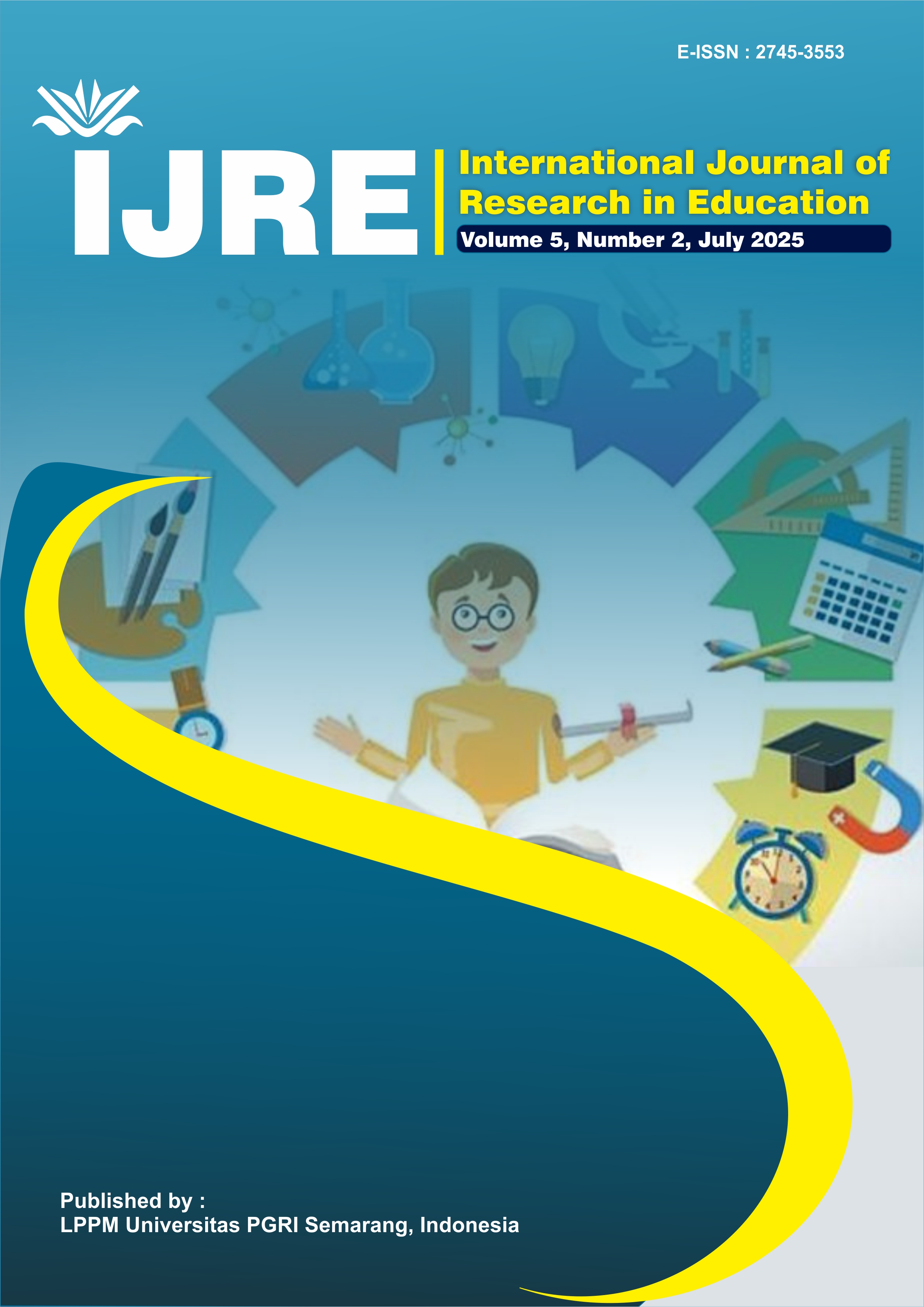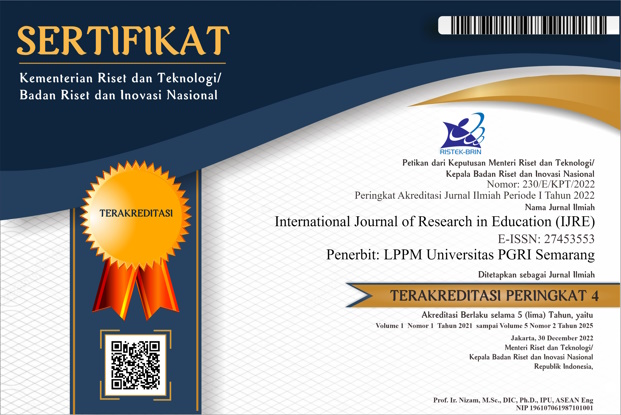The Relationship Between High School Student's Self-Confidence and Speaking Performance
DOI:
https://doi.org/10.26877/1q2zk421Keywords:
correlation, self-confidence, speaking performanceAbstract
This study aims to examine the correlation between students' self-confidence and speaking performance at SMAN 1 Candipuro. The researchers employed a quantitative research design. The sample for this research consists of students from classes XI F3 and XI F4.The sample of this study was 69 of those students. The researchers used the students' speaking test scores as the main indicator to classify them as samples for this research. To collect data, the researchers used two research instruments: a speaking test and questionnaires. The speaking test was used to measure the students' speaking abilities, the questionnaires measured their levels of self-confidence. The results of the correlation analysis showed that there is significant correlation between students' self-confidence and their speaking performance at SMAN 1 Candipuro. This is supported by a p-value of 0.392 which is lower than the alpha level of 0.753. Based on the result, it was shown that 0.392 was in interval low correlation between self-confidence and English-speaking skill. Higher self-confidence is associated with better speaking abilities. This suggests that enhancing students' self-confidence can improve their speaking skills
References
Here's the bibliography with a single line break between each entry:
Aoyama, T., & Takahashi, T. (2020). International students’ willingness to communicate in english as a second language: The effects of l2 self-confidence, acculturation, and motivational types. Journal of International Students, 10(3), 703–723. https://doi.org/10.32674/jis.v10i3.730
Audina, R. M., Hasanah, A., & Desvitasari, D. (2021). The Correlation between self-confidence of the undergraduate efl students and their speaking achievement. Jadila: Journal of Development and Innovation in Language and Literature Education, 1(4), 518–533. https://doi.org/10.52690/jadila.v1i4.161
Brokowski C, A. M. (2019). 乳鼠心肌提取 HHS Public Access. Physiology & Behavior, 176(5), 139–148. https://doi.org/10.1177/1745691618804166.Mindsets
Brown, J. D. (2017). Developing and using rubrics : Analytic or holistic ? Shiken, 21(2), 20–26.
Collin C.Ceneciro, Marivic R. Estoque, & Jason V. Chavez. (2023). Analysis of debate skills to the learners’ confidence and anxiety in the use of the english language in academic engagements. Journal of Namibian Studies : History Politics Culture, 33, 4544–4569. https://doi.org/10.59670/jns.v33i.2812
Dewaele, J., & Macintyre, P. (2022). Do Flow , Enjoyment and Anxiety emerge equally in English ForeiDewaele, J., & Macintyre, P. (2021). Do Flow , Enjoyment and Anxiety emerge equally in English Foreign Language Classrooms as in other Foreign Language Classrooms ? O Fluxo , o Prazer e a Ansi. 22(1), 156–180.
Dörnyei, Z. (2009). The L2 motivational self system. Motivation, Language Identity and the L2 Self, 8(4), 9–42. https://doi.org/10.21832/9781847691293-003
Ebn-Abbasi, F., Fattahi, N., Azari Noughabi, M., & Botes, E. (2024). The strength of self and L2 willingness to communicate: The role of L2 grit, ideal L2 self and language mindset. In System (Vol. 123). https://doi.org/10.1016/j.system.2024.103334
Fatima, I., Mohamed Ismail, S. A. M., Pathan, Z. H., & Memon, U. (2020). The power of openness to experience, extraversion, L2 self-confidence, classroom environment in predicting L2 willingness to communicate. International Journal of Instruction, 13(3), 909–924. https://doi.org/10.29333/iji.2020.13360a
Ghafar, Z. (2023). The Influence of self-confidence on english language learning: A systematic review. International Journal of Applied Educational Research (IJAER), 1(1), 55–68. https://doi.org/10.59890/ijaer.v1i1.452
Glover, E. (2018). The Psychology of The Psycho-Therapeutist*. In On the Early Development of Mind. https://doi.org/10.4324/9781315125671-6
Guebba, B. (2021). The nature of speaking in the classroom: an overview. Middle East Research Journal of Linguistics and Literature, 1(1), 9–12. https://doi.org/10.36348/merjll.2021.v01i01.002
Gürler, İ. (2015). Correlation between self-confidence and speaking skill of english language teaching and english language and literature preparatory students. Curr Res Soc Sci, 1(2), 14–19.
Jack C. Richards. (2015). Key issues in language teaching [Book Review]. English Australia Journal, 32(1), 113–116.
Karsudianto, F. (2020). Improving students’ motivation and self-confidence in speaking using mingling games. Journal of Applied Studies in Language, 4(1), 1–8. https://doi.org/10.31940/jasl.v4i1.1591
Lantolf, J. P., Poehner, M. E., & Thorne, S. L. (2020). Sociocultural theory and l2 development. Theories in Second Language Acquisition, 223–247. https://doi.org/10.4324/9780429503986-10
Lasiyah. (2017). The Correlation between self-confidence and speaking achievement of the undergraduate students of english study program of UIN Raden Fatah Palembang.
Latham, G. P., & Seijts, G. H. (2016). Distinguished scholar invited essay: similarities and differences among performance, behavioral, and learning goals. Journal of Leadership and Organizational Studies, 23(3), 225–233. https://doi.org/10.1177/1548051816641874
Luana Sasabone, Yuriatson Jubhari, Sukmawati, & Sujarwo. (2021). the implementation of english for specific purposes (esp) in improving students speaking skill of UKI Paulus Makassar. Edulec : Education, Language and Culture Journal, 1(1), 1–8. https://doi.org/10.56314/edulec.v1i1.1
Macintyre, P. D., Gregersen, T., & Mercer, S. (2019). Setting an agenda for positive psychology in sla: theory, practice, and research. Modern Language Journal, 103(1), 262–274. https://doi.org/10.1111/modl.12544
Mercer, S., & MacIntyre, P. D. (2014). Introducing positive psychology to SLA. Studies in Second Language Learning and Teaching, 4(2), 153–172. https://doi.org/10.14746/ssllt.2014.4.2.2
Meškauskienė, A. (2017). The Impact of teaching environment on adolescent self – esteem formation. European Journal of Social Sciences Education and Research, 10(1), 112. https://doi.org/10.26417/ejser.v10i1.p112-120
Mustafa, E. (2015). Psychological factors affecting sudanese efl learners’ oral performance.
Nadiah, Arina, & Ikhrom. (2019). The Students’ self-confidence in public speaking. ELITE Journal, 1(1), 1–11.
Newton, J., & Nation, I. S. P. (2009). Teaching ESL EFL listening and speaking (Esl & Applied Linguistics Professional). Routledge.
Ni Wayan Ema Parmita. (2022). the Correlation between self confidence and english speaking skill of the eighth-grade students of Smpn 1 Blahbatuh. Academic Journal on English Studies, 2(1), 56–62.
Obligatoria, S., Mohan, B., & Hemnani, B. (2023). The Development of Oral Interaction : The Use of Functional Language to Achieve Communicative Efficiency in the EFL Classroom.
Oney, E., & Oksuzoglu-Guven, G. (2015). Confidence: A critical review of the literature and an alternative perspective for general and specific self-confidence. Psychological Reports, 116(1), 149–163. https://doi.org/10.2466/07.PR0.116k14w0
Perkins, D., & Sarris, J. (2021). Ayahuasca and childhood trauma: Potential therapeutic applications. Ayahuasca Healing and Science, 99–115. https://doi.org/10.1007/978-3-030-55688-4_6
Purwanti, N. K. R., Suwastini, N. K. A., Adnyani, N. L. P. S., & Kultsum, U. (2022). Youtube videos for improving speaking skills: the benefits and challenges according to recent research in efl context. Jurnal Pendidikan Teknologi Dan Kejuruan, 19(1), 66–75. https://doi.org/10.23887/jptk-undiksha.v19i1.41108
Rahmaniah, R., & Asbah, A. (2019). The speaking difficulties encountered by non-english students in language classroom. Linguistics and Elt Journal, 5(1), 22. https://doi.org/10.31764/leltj.v12i2.749
Ummah, M. S. (2019). No 主観的健康感を中心とした在宅高齢者における 健康関連指標に関する共分散構造分析Title. Sustainability (Switzerland), 11(1), 1–14. http://scioteca.caf.com/bitstream/handle/123456789/1091/RED2017-Eng-8ene.pdf?sequence=12&isAllowed=y%0Ahttp://dx.doi.org/10.1016/j.regsciurbeco.2008.06.005%0Ahttps://www.researchgate.net/publication/305320484_SISTEM_PEMBETUNGAN_TERPUSAT_STRATEGI_MELESTARI
Yousefabadi, M. M., Ghasemnezhad, T., & Akbarie, Y. (2022). The effect of anxiety, motivation and self-confidence in language learners’ reading proficiency. NeuroQuantology, 20(16), 4966–4976. https://doi.org/10.48047/NQ.2022.20.16.NQ880504



